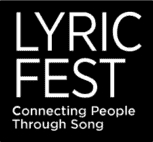We had an opportunity to catch up with Daron Hagen who has composed a new song cycle for Lyric Fest’s New Journey into Song concert on January 27, at 3pm at The Academy of Vocal Arts. The new work entitled “After Words” was commissioned in celebration of Lyric Fest’s 10th Anniversary season.
Q: No spoilers here, but tell us a little about the work you created.
A: I was asked to compose a work that is a response to Winterreise by Schubert. It’s a humbling and intimidating task but, of course, I said a resounding “yes.”
What I elected to do, because I am primarily an opera composer, is to create a 25 minute opera for two angels — a man and woman — who have just attended a performance of Winterreise. The first song [of my work] takes the words of the final song and weaves in a contemporary poem by Peter Handke. These are the words used at beginning of the film, “Wings of Desire”, in which two angels look down on city of Berlin and its inhabitants. I chose to make the words comment on the original Schubert work.
The three songs that follow find the angels observing the living. The first, An Artist, finds the two observing a young artist at work. The second, Widgeon, is a coolly damning observation on where an artist’s voice may or may not come from. The third,The Rain Stick, is a commentary on the nature of song itself. These songs about creativity use the Irish poet, Seamus Heaney. As an aside, I love his work so much I named one of my sons after Seamus Heaney.
For the fifth song my wife, whose mother is from Nicaragua, translated a Rubén Darío mediation on earthly love.
The final song contrasts the German and English, setting words of the King James version of Corinthians. I’ve juxtaposed the English King James version with the German translation of Martin Luther. That translation is dear to me because I am a Lutheran.
So, the transit of the cycle is two angels listening on high to Winterreise with conversations for rest of cycle on humanity, love and creativity. It ends with a heavenly discourse drawn from the Bible. The work is called “After Words” because it comes after Wintererise and is also about the after-life.
Q: So, as a composer when you are asked to specifically compose a piece in response to another work, is it restraining, or does it take you to places you might not have gone?
A: [with laughter] Well, money always helps creativity! But in this case, this long song cycle [Winterreise] is a physical and emotional marathon for a singer. I paid special attention to the words and some of the music in his cycle, but the process [to creating my cycle] was to listen to the last song in Winterreise… The inspiration was that final song, and my way in was with the two angels. Although I am not particularly religious I do believe in angels and they are fascinating to me. I wrote an opera in which the title character, Amelia, through conversations with angels resolves the death of her pilot father who died in Vietnam when she was child.
Q. You are primarily known as an opera composer and an “American song composer.” Is there something uniquely American about your work?
A: I am not interested in nationalism. I write the kind of music that I like to do and it is the exact style I wrote when I was 15. I didn’t choose it, it chose me. This is where I live and if I sound that way it just ended up that way. People who are not creative artists assume we have control over what we do. If you are a craftsman, that’s true. You make a chair that has four legs, but if you are an artist like Frank Lloyd Wright you make a chair with three legs.
Q: What do you look for in a given text that makes you feel it would be a good song?
A: Brevity! That’s a glib answer but I really do look for short text. In my experience spoken words last longer when set to music — two to three times longer — so brevity is important. Librettos often seem silly when you read them — they need muscles to flesh out the words.
Q: For the novice concert goer, what would you tell them about New Journey Into Song?
This is really like going to a coffee house and having a drink while someone sings songs. If you’ve never heard a song cycle, realize Bob Dylan writes poetry and sings them to tunes. Setting words to music is an act of love of literature, and what can happen when you make a third element, [a new work of art out of poetry and music put together.]
Q: You went to Curtis so you have some old haunts here in Philadelphia. What will you do when you get into town for the performance of “After Words”?
A: We all have our little rituals. The first thing I do whenever I come back to Philadelphia is to walk to Rittenhouse Square and knock on the door of the former residence of Henry McIlheny He not only collected impressionist and modern art, but he was also a patron of Curtis students. I was taken there every semester for tea and Mr. McIlheny would always ask, “How is your work going, darling?” Then, “All right dear, Ned and I are going to talk now.” And, of course, I was expected to be quiet and just listen. Henry was my patron so, out of sentiment, I’ll always knock on Henry’s door when I am in town.
Interviewed by Lari Robling
